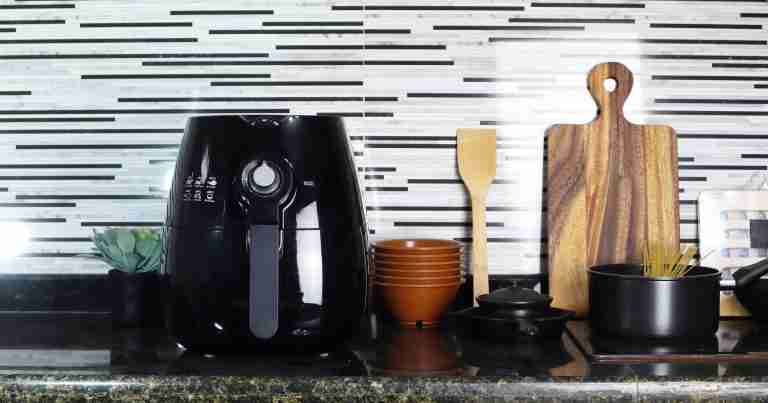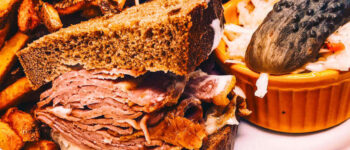Air fryers are a staple in many kitchens, offering a healthier alternative to deep-frying. If you’ve heard rumors about the risks of air fryers, you may be wondering about the safety of this kitchen gadget. Does your air fryer cause cancer?
As a Registered Dietitian Nutritionist, I am often asked about the safety and health implications of air fryers. Here we explore the potential link between air fryers and cancer and provide tips to use air fryers for healthy cooking.
Let’s delve into the debate: is the air fryer a culinary hero or a hidden culprit?
Unraveling the Debate on Air Fryers and Cancer
Air fryers have gained popularity for their promise of providing a healthier way to enjoy fried foods. They claim to make crispy, delicious foods with less oil, cutting calories and reducing health risks.
But let’s take a closer look to see if they really live up to the hype!
Some studies suggest air frying may reduce harmful compounds compared to deep frying- and that’s a good thing!
Other studies cite potential cancer-causing risks, including the formation of harmful chemicals when certain foods are cooked at high temperatures.
In addition, the release of toxic fumes and particles from the cooking process in air fryers may pose potential health risks if inhaled excessively.
Thus, we must be cautious and rely on credible sources to make informed choices for our health. We may not have all the answers (yet), but we do have some good information to help reduce risk and maximize benefit.

What is an Air Fryer and How Does it Work?
An air fryer is a trendy kitchen gadget that uses hot air to cook food with less oil, giving it a crispy texture, similar to deep-fried foods.
It’s like a mini countertop oven with a heating element and powerful fan that circulates hot air, cooking food from all angles. It’s perfect for making crispy fries, juicy chicken, and even zucchini!
The magic of air frying lies in its ability to create indulgent texture with minimal oil. It can be a guilt-free way to enjoy your favorite fried foods! Plus, air fryers are versatile – you can cook everything from veggies to desserts.
However, be mindful of nutrient-rich foods and portion sizes. While air frying can be healthier than deep frying, caution is needed for certain foods.
Air Fryers vs Deep Fryers
Air fryers and deep fryers are two different methods of cooking that result in crispy and delicious fried foods. The main difference between them is the amount of oil used for cooking.
Air fryers use significantly little or no oil, while deep fryers use a significant amount of oil for frying.
Air frying is generally better for those watching their fat and calorie intake. Deep frying typically creates foods that are high in unhealthy fats, calories, and cholesterol.
However, air fryers require longer cooking times than deep frying, which can create unhealthy substances (more on this later).
Let’s take a look at the pros and cons of air fryers and tease out the best solution for you.
Understanding Air Fryers: Health Claims and Reality
Just like a gym membership won’t make you fit, an air fryer won’t automatically make meals healthy.
While it can help you reduce oil and make crispy foods with less guilt, the quality and quantity of the food you cook still matters.
Using an air fryer to make French fries from scratch with fresh potatoes is definitely better than using a deep fryer. But it’s still not the same as eating a balanced meal with plenty of veggies and lean protein.
Similarly, air frying frozen processed foods like French fries or chicken nuggets may be convenient, but will contain added sodium, fat and preservatives.
While an air fryer can be part of a well-rounded healthy eating plan that includes whole, unprocessed foods, it’s not a magic bullet!

Health Benefits of Air Fryers
Less oil. Air fryers require minimal to no added oil, reducing overall calorie and fat intake.
Healthier cooking. Air-fried foods have a crispy texture with less added fats, making them a potential option for those watching their fat intake.
Convenient and time-saving. Air fryers cook food faster than conventional ovens, making them ideal for busy households.
See more : Does BBQ Sauce Need To Be Refrigerated? Your Sauce Storage Solutions
Retained flavors and nutrients. Quick cooking time in air fryers can help in preserving the natural flavors and nutrients of the food.
Easy to clean. Air fryers typically have removable parts that can be washed in a dishwasher, making clean-up hassle-free.
Weight management. Lower calorie and fat intake from air frying may be beneficial for weight management and heart health.
Versatility. Air fryers can cook a wide range of foods, from fries and chicken wings to vegetables and even desserts.
Fewer harmful compounds. Air frying may reduce the formation of harmful compounds (more on this later) compared to deep frying.
Safer option. Air fryers eliminate the need for hot oil, reducing the risk of burns or accidents in the kitchen.
Flavorful results. Air frying can produce crispy and delicious results without the need for excessive oil, making it a popular choice for health enthusiasts.
Separating Fact from Fiction: Air Fryers, Cancer, and Other Health Concerns
Current evidence about the health risks of air fryers is limited and inconclusive. However, it’s important to consider the potential risks of this popular kitchen appliance.
Here we’ll discuss the potential risks of using an air fryer and offer solutions to reduce or eliminate those risks.

Air Frying and Acrylamide
Some cooking methods, including air frying, can produce a harmful chemical called acrylamide. The Environmental Protection Agency has classified acrylamide as a probable human carcinogen, which means it likely causes cancer.
When certain foods are cooked at temperatures above 248°F (120°C), regardless of the cooking method, it increases the formation of acrylamide.
The formation of acrylamide varies depending on the temperature, time duration, type of food being cooked, and other factors.
Generally speaking, higher temperatures and longer cooking times increase the amount of acrylamide formation (1). It is the temperature that matters most, not the cooking method.
Foods Most Likely to Produce Acrylamides
However, air frying has gained attention for potentially reducing acrylamide formation due to the shorter cooking time (than roasting or baking) and the absence of oil.
Pro-tip: To minimize risk, use lower temperatures and less oil.
Pro-tip: Soaking potatoes before frying reduces acrylamide formation (2).
The Risk of Plastics and Non-stick Coatings
When it comes to air fryers, the material of the interior is a crucial factor to consider in terms of potential health risks.
Some air fryers have plastic interiors or non-stick coating, which may release toxic chemicals when exposed to high temperatures.
Research suggests that plastic materials, especially when heated, can release chemicals like bisphenol A (BPA) and phthalates, which may have negative effects on health.
Non-stick coatings, such as Teflon, may release perfluorooctanoic acid (PFOA) when heated to high temperatures. PFOA is associated with increased risk of cancer, including testicular, kidney, prostate, and ovarian and non-Hodgkin lymphoma (3).
In contrast, air fryers with stainless steel interiors are considered safer, as stainless steel is less likely to leach harmful chemicals into food during cooking or create harmful fumes.
Pro-tip: Choose non-toxic air fryers with stainless steel interiors or opt for other cooking methods that do not involve plastic materials.

Other Chemicals Released into the Air
When using air fryers, it’s important to be aware of the potential release of volatile chemicals into the air and take necessary precautions.
Air fryers circulate hot air to cook food. During this process, volatile organic compounds (VOCs) may be released into the air from the food and cooking oil used.
VOCs can contribute to indoor air pollution and may have adverse health effects when inhaled in high concentrations over a prolonged period of time.
To reduce the release of VOCs, avoid cooking foods with high fat content, as they tend to generate more smoke and potentially release more VOCs.
See more : Pinot Noir Vs Pinot Grigio (7 Key Differences)
Using fresh ingredients, avoiding overcrowding the air fryer basket, and cleaning the air fryer regularly can reduce the release of volatile chemicals.
Pro-tip: Use air fryers near a range hood or an open window to minimize the buildup of VOCs in the indoor air.
As always, it’s important to follow manufacturer instructions and safety guidelines for your specific air fryer model to ensure safe and healthy cooking practices.
Air Fryers and Polycyclic Aromatic Hydrocarbons
Polycyclic aromatic hydrocarbons (PAHs) are chemicals that can form when cooking food at high temperatures. PAHs are known to be carcinogenic (cause cancer) and may pose health risks when consumed in large quantities over time (4).
PAHs are formed when fat and juices come into contact with the heating element or hot surfaces, generating smoke which may contain PAHs (5). This smoke can then be released into the air and potentially inhaled.
To minimize PAH formation in air fryers, it’s important to use lean meats with lower fat content, as PAHs tend to form more readily in fatty foods.
Pro-tip: Clean your air fryer often to reduce the accumulation of food residues that can cause PAH formation.
Air Fryers and Heterocyclic Amines
Heterocyclic amines (HCAs) are chemicals that can form when certain foods, particularly meat and poultry, are cooked at high temperatures.
While air fryers can be a healthier alternative to traditional frying methods, they still use high heat for cooking, and there is a potential risk of HCA formation.
HCAs may increase the risk of different types of cancer, including colon, breast, and prostate cancer (6, 7). They may also damage the DNA in cells, disrupting normal cell function and potentially creating genetic mutations that increase cancer risk.
Red meat and processed meat have been shown to have a higher risk of HCA formation compared to other meats. Choose lean meats like chicken or fish, and avoid processed meats like sausages or hot dogs, to minimize HCA formation.
Marinating meat or poultry in acidic ingredients like lemon juice or vinegar before air frying reduces HCAs. The acidic marinade acts as a barrier, preventing the direct contact of meat with high heat and reducing HCA formation.
Lowering the cooking temperature in your air fryer can help reduce the formation of HCAs. Experiment with lower temperatures and longer cooking times to achieve desired results while minimizing the risk of HCA formation.
Pro-tip: Add rosemary to meat to reduce HCA formation (8).

Healthy Cooking with Air Fryers to Reduce Cancer Risk
Use healthy oils. Although air fryers require little oil, it’s still important to choose healthy oils. Opt for heart-healthy oils like olive oil, avocado oil, or coconut oil and avoid using too much oil.
Don’t overcrowd the basket. Overcrowding the air fryer basket causes uneven cooking and results in the release of more smoke and potentially harmful fumes.
Season your food. To add flavor without adding extra calories, use herbs, spices, and seasonings to your food before cooking. This can enhance the taste of your food without adding extra fat or salt.
Choose lean proteins. Lean proteins like chicken breasts, fish, and tofu are less likely to produce harmful substances compared to processed or fatty foods. Avoid using fatty meats like bacon or sausages.
Use whole foods (not packaged foods). Air fryers are perfect for cooking whole foods like sweet potatoes, Brussels sprouts, and carrots. Whole foods that are packed with fiber, vitamins, and minerals can help you feel full and satisfied.
Use the right temperature and time. Each air fryer is different, so it’s important to read the instructions and follow the recommended settings. Overcooking, excessively high heat, or burning food can increase the production of potentially dangerous compounds.
Clean your air fryer regularly. Remove any accumulated food debris or grease that can potentially contribute to the formation of harmful chemical substances and bacteria.
Pro-tip: Air frying is just one method of cooking. It’s important to have a balanced diet that includes a variety of cooking techniques and foods for optimal nutrition.
Is Your Air Fryer a Healthy Hero or Cancer-Causing Culprit?
When used wisely, air fryers can be a valuable tool in your culinary arsenal, supporting your overall well-being and healthy lifestyle choices.
Use minimal oil, choose wholesome ingredients, avoid plastics and non-stick coatings, and maintain good ventilation to enjoy deliciously crispy and flavorful meals without concerns about cancer-causing risks.
So go ahead, unleash the culinary hero within and savor the joys of healthy cooking with your air fryer!
Sharing is caring!
Nigel Gildon editor:Nigel Gildon is the editor of Chef Wayne’s Big Mamou: Chef Wayne’s Big Mamou. He has worked in the publishing industry for many years and has a passion for helping new authors get their work into the hands of readers. 63 Liberty Street * Springfield, MA 01003






